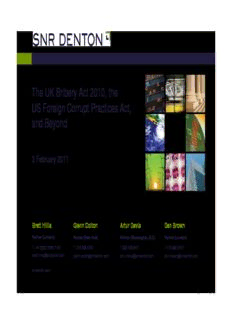
The UK Bribery Act 2010, the US Foreign Corrupt Practices Act, and Beyond PDF
Preview The UK Bribery Act 2010, the US Foreign Corrupt Practices Act, and Beyond
The UK Bribery Act 2010, the US Foreign Corrupt Practices Act, and Beyond 3 February 2011 Brett Hillis Glenn Colton Artur Davis Dan Brown Partner (London) Partner (New York) Partner (Washington, D.C.) Partner (London) T +44 (0)20 7246 7142 T 212 398 5797 T 202 408 6471 T 415 882 2477 [email protected] [email protected] [email protected] [email protected] snrdenton.com 1 Agenda (cid:131) Background (cid:131) Legislation overview – UK Bribery Act – US Foreign Corrupt Practices Act (cid:131) Critical differences between the laws and the enforcement postures (cid:131) Other Jurisdictions (cid:131) Practical recommendations for adequate procedures (cid:131) Organizational preparations (cid:131) Case studies 2 UK Bribery Act 2010 Background (cid:131) OECD Convention on Combating Bribery of Foreign Public Officials in International Business 1998 (cid:131) Corruption allegations against BAE Systems surface 2003 (cid:131) Law Commission report on Reforming Bribery 2008 (cid:131) Draft Bribery Bill March 2009 (cid:131) Bribery Act 2010 Royal Assent April 2010 – expected in force…? – no transitional provisions/grace periods (cid:131) Government review? 3 UK Bribery Act 2010 replaces (cid:131) Common law (cid:131) Public Bodies Corrupt Practices Act 1889 (cid:131) Prevention of Corruption Act 1906 (cid:131) Prevention of Corruption Act 1916 4 The Law 5 Bribing (UK) Person may commit following offences: (cid:131) Section 1: Bribing another person – Offers, promises or gives a financial or other advantage to another (directly or indirectly); and – Intends the advantage to induce/reward a person for the improper performance of a relevant function or activity; or – Knows or believes the acceptance of the advantage is itself improper performance. (cid:131) EXAMPLE: P provides a friend (who works in the same company as X) £10,000 to give to X, to persuade X to send P confidential information about the company that P wants in connection with her own business. 6 Being Bribed (UK) Person may commit following offences: (cid:131) Section 2: Being bribed – Requests, agrees to receive or accepts a financial or other advantage (directly or indirectly); and (a) intends there to be improper performance as a consequence; or (b) there is improper performance of relevant function or activity (whether as reward, in anticipation or consequence of request, agreement or acceptance) – In the cases outlined in (b), no requirement for person to know or believe that performance of the function or activity is improper 7 Being Bribed (UK) (cid:131) EXAMPLES: (a) R asks P for £10,000 if R or R’s colleague tampers with supporting documents submitted by rival bidders for a contract P is seeking with R’s employer. (b) R, a civil servant, asks for £1,000 for himself to process a routine application. (c) R, a civil servant, asks for £1,000 from P as a reward, having processed P’s application especially quickly. (d) R, an agent, accepts P’s bid for a contract on behalf of a company, because R expects P secretly to reward him personally. 8 Bribing Foreign Officials (UK) Person may also commit following offence: (cid:131) Section 6: Bribing foreign public officials – Offers, promises or gives any financial or other advantage to a foreign public official (directly or indirectly); and – Intends to (1) influence foreign public official; and (2) obtain or retain business or advantage in conduct of business; and – The foreign public official is neither permitted nor required by applicable written law to be influenced by offer promise or gift. – No requirement for conduct to be deemed improper – “Foreign public official” widely defined – Foreign public official does not commit offence by being bribed (with limited exception) 9 Bribing Foreign Officials (UK) (cid:131) EXAMPLE: (offence) P asks R, a civil servant in Toyland, to process quickly P’s application for licence to engage in construction work in Toyland. R says that will only be possible if P provides X, a relative of R, with help in the conversion of flats on X’s land. P agrees to provide the help. (cid:131) EXAMPLE: (no offence) P asks R, a civil servant in Toyland, to process quickly P’s application for a licence to engage in construction work in Toyland. R says that will only be possible if P helps to build a new school in Toyland. P agrees to provide the help. The written law applicable to R says that favourable treatment may be given to foreign businesses if they agree to fund school building work in Toyland. 10
Description: